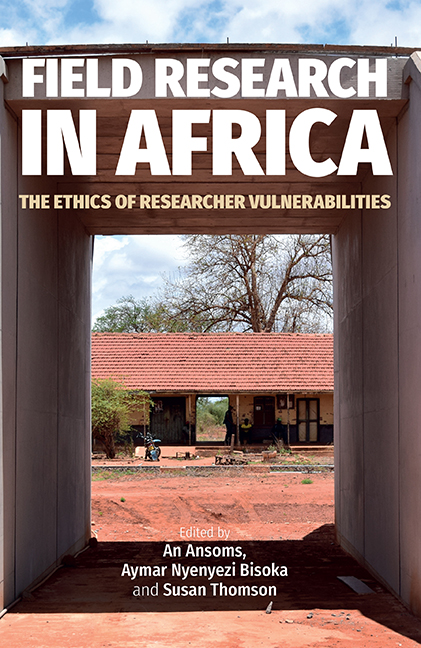Book contents
- Frontmatter
- Contents
- List of Contributors
- Foreword: It is about Us
- Map of Africa showing Fields of Research
- Introduction: Fields of Vision, Emotion as Reflexivity
- 1 Skin Connections: Negotiating Institutional Ethics alongside Insider Identities
- 2 Conducting Sensitive Research ‘At Home’: A Matter of Responsibility
- 3 A Gendered Research Journey: Ethical Dilemmas of an Algerian Immigrant Recovering the Memory of ‘Home'
- 4 Establishing Kinship in the Diaspora: Conducting Research among Fellow Congolese Immigrants of Cape Town
- 5 ‘If they find out, we're dead': Intermediaries, Self-censorship, and Anxiety in Research as an Outsider-Insider
- 6 Looking Behind the Screen: Ethical Quagmires when Accessing Hidden Discourses
- 7 Scholar-Activist? On Relational Accountability and an Ethic of Dissemination
- Conclusion: Theorising Self as Ethical Research Practice
- Bibliography
- Index
Conclusion: Theorising Self as Ethical Research Practice
Published online by Cambridge University Press: 10 June 2021
- Frontmatter
- Contents
- List of Contributors
- Foreword: It is about Us
- Map of Africa showing Fields of Research
- Introduction: Fields of Vision, Emotion as Reflexivity
- 1 Skin Connections: Negotiating Institutional Ethics alongside Insider Identities
- 2 Conducting Sensitive Research ‘At Home’: A Matter of Responsibility
- 3 A Gendered Research Journey: Ethical Dilemmas of an Algerian Immigrant Recovering the Memory of ‘Home'
- 4 Establishing Kinship in the Diaspora: Conducting Research among Fellow Congolese Immigrants of Cape Town
- 5 ‘If they find out, we're dead': Intermediaries, Self-censorship, and Anxiety in Research as an Outsider-Insider
- 6 Looking Behind the Screen: Ethical Quagmires when Accessing Hidden Discourses
- 7 Scholar-Activist? On Relational Accountability and an Ethic of Dissemination
- Conclusion: Theorising Self as Ethical Research Practice
- Bibliography
- Index
Summary
AS THE PRECEDING chapters illustrate, researchers who work and live in fragile settings are often motivated to identify the drivers of violence, to document human rights abuses, and to learn how individuals and communities recover from violence. For many researchers, including those who contributed to this book, the underlying rationale is to study and record the lives of people, who, historically speaking, would otherwise remain unknown, or whose stories are told by local elites or foreign humanitarians. Central to this mode of understanding violence from the perspective of those subject to it, are systematic and careful efforts to diminish the distinction between the researcher-as-authority and the informant-as-subject. This is the unifying theme of our collection. Each contributor presents a personal essay which illustrates the importance of understanding the Self as an instrument of knowledge production, and to better understand the ethic of self-knowledge. In so doing, our authors affirm something that all field-based researchers know – academic knowledge develops out of specific social and political contexts and in collaboration with a variety of actors, most notably the people who consent to take part in our research.
Indeed, as scholars know all too well, the production of knowledge obeys disciplinary standards; the primary one being that what we know is preceded by what we think – that is our implicit and explicit biases – which in turn determines our methodology and methods (Simon 1979. See also Macamo in this book). In other words, presumed a priori knowledge informs what is possible for us, as individuals to know, and how we think we know it determines what counts as knowledge. Context – historical, political, social, and so on – is a critical factor in challenging what we think we know, or what we think we need to know about a particular event, place, or people. As such, bringing together a diverse range of scholars from a variety of backgrounds enlivens what counts as knowledge in the confines of the Western academy, while generating new ways of thinking about what we think we know, and how through an ethic of fieldwork.
Reflexivity and Positionality in Research
We are hardly the first to centre the Self as an instrument of knowledge.
- Type
- Chapter
- Information
- Field Research in AfricaThe Ethics of Researcher Vulnerabilities, pp. 137 - 144Publisher: Boydell & BrewerPrint publication year: 2021



